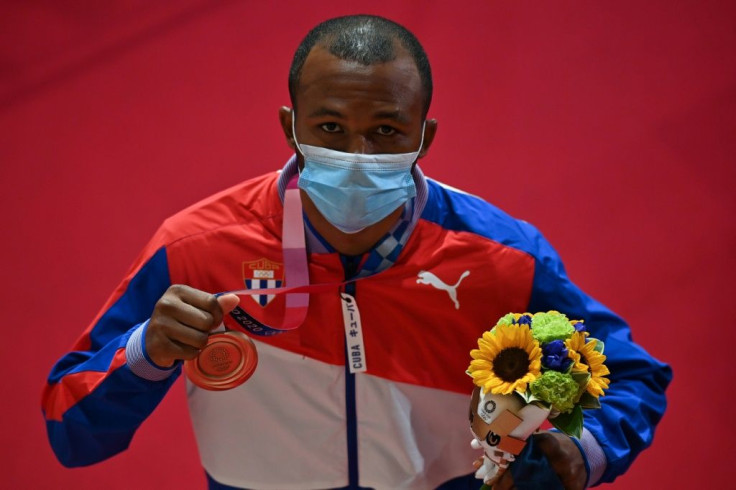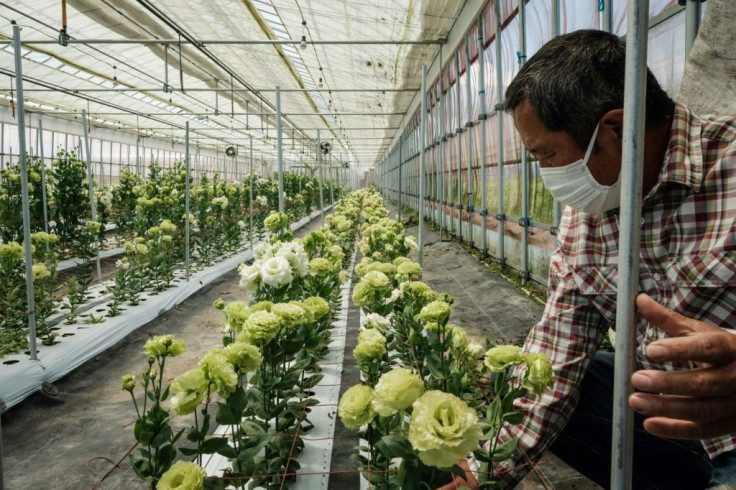Fukushima Blooms Of 'Hope' In Olympic Bouquets
The pint-sized bouquets handed to Tokyo Olympic winners alongside their medals are carrying a symbolic message of hope, with their blooms grown in the area devastated by Japan's 2011 earthquake, tsunami and nuclear disaster.
This year's Games has been dubbed the "Recovery Olympics", and was intended to showcase rebuilding in parts of northeast Japan where 18,000 people were killed or went missing in the tsunami.
There's been no flood of visitors to the region because of the pandemic, but being featured in the Olympic bouquets has offered local growers an international showcase.
"I'm delighted when I see athletes holding the bouquet and a medal," said Yukari Shimizu, 55, a flower farmer from Fukushima's Namie, one of the towns worst affected by the disaster.
The bouquets given to medallists feature delicate eustoma blooms and Solomon's seals from Fukushima region, sunflowers from Miyagi region and gentians from Iwate region -- all areas affected by the disaster.

Bundled with a cuddly Tokyo 2020 mascot, they've been seen around the world in pictures of athletes on the podium, much to Shimizu's delight.
"The floral language of eustomas is hope. I want to continue growing good flowers, with hope in my heart," she said.
Fukushima was the site of the worst nuclear disaster since Chernobyl when the killer tsunami triggered by an undersea quake overwhelmed a local nuclear plant.
Around 165,000 people fled their homes in the area, either under evacuation orders or voluntarily, with 12 percent of the prefecture declared off-limits in the immediate aftermath.
Since then, numerous areas have been declared safe after extensive decontamination, and incentives are being offered to draw people back, but life hasn't exactly returned to normal.

"In Namie, some people are working hard to try to restore the lives they had before, and some others are still in evacuation and can't come home," Shimizu said.
"Some have decided not to come back. I don't think I can say the community has recovered 100 percent."
After evacuated residents were allowed to come back home for daytime visits in 2013, Shimizu tried to grow vegetables, but they had detectable radioactivity levels.
"I was at a loss when I discovered that I could not grow food here," she said.
Hiroshi Kawamura, 65, one of her colleagues at a local agricultural group suggested they grow eustomas together, but initially she wasn't keen.
"At first I was against growing eustomas, because I only knew the types that come with white petals that have coloured edges, which I thought were a bit sad looking," she said.
But seeing a beautiful crop of the flowers in a greenhouse one day changed her mind.
"I saw flowers as beautiful as roses. I thought they were gorgeous," she said. "That made me keen to grow."
Food products from Fukushima are still banned in some countries, despite stringent testing measures, but Kawamura says the region remembers receiving "a lot of support from the world" after the 2011 disaster.
"Through the victory bouquets, we want to express our gratitude, and show the world how much we have moved towards recovery," he said.
© Copyright AFP 2024. All rights reserved.





















